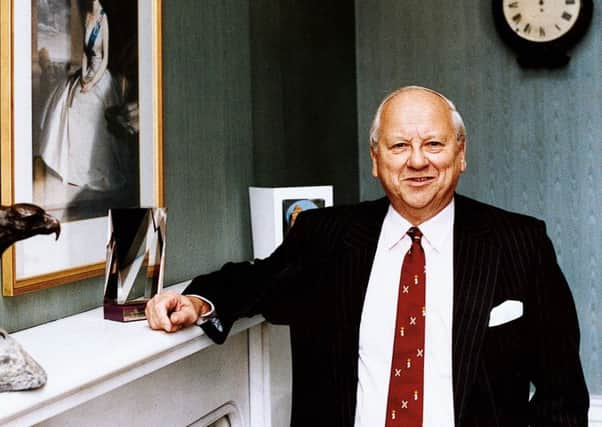Obituary: Sir Denys Henderson, businessman


Sir Denys Henderson never let himself forget his gritty Scottish origins when he rose to the top of British business as chairman of the nation’s biggest manufacturer, ICI.
As a “loon fae Aiberdeen”, he still felt pleased and surprised, even at the height of his career in the 1980s and 1990s, to be included among the great and good, and find his opinions courted.
Advertisement
Hide AdAdvertisement
Hide AdSo great grew his prestige, indeed, that in the House of Commons debate in 1993 on the 1992 Maastricht Treaty setting up the European Union, views said to be his were bandied about by government and opposition speakers alike, including the Prime Minister, John Major, each claiming Sir Denys’s support for their position.
His high reputation sprang from his boldness in making changes, and his success in seeing off challenge. He was knighted in 1989.
His mark left on ICI and its huge range of products, from explosives, to paint and other chemicals, was its demerger in 1993, when he split the business, hiving off the pharmaceuticals arm to be an independent concern called Zeneca. This allowed the different areas of production to thrive, instead of being held back in a too-unwieldy combine.
Earlier, in 1991, he had resisted a hostile take-over attempt by Hanson plc, the building materials concern. That move against ICI, it has been surmised, may have been a factor in Henderson’s decision to divide it.
The split was, he later said, his most difficult decision, and the weight of ICI’s tradition as a single company since its foundation in 1926 had borne down heavily on him. He remained chairman of both until 1995. ICI would be taken over by Akzo Nobel in 2008, and Zeneca would merge with the Swedish pharmaceutical company Astra AB in 1999.
Henderson had arrived as ICI’s chairman in 1987, the year of the “Black Monday” worldwide stock market crash, and is credited with having seen the company through the recession that followed.
From ICI he went on to chair another huge combine, the Rank Organisation, in yet another area, entertainment, until 2001.
“I do believe that the kind of experience you gain as head of ICI is transferable,” he reflected. “ Your skills as a chairman are concerned with broad strategy, corporate finance – and people. You must make the most senior appointments and be sure you have the right people coming up.”
Advertisement
Hide AdAdvertisement
Hide AdAt the same time, between 1995 and 2002, Henderson served as First Commissioner, or chairman, of the Crown Estate, with responsibility for managing assets including the Glenlivet Estate in his beloved North-east, as well as historic English sources of wealth such as St James’s in London, Ascot racecourse and Windsor Great Park.
His many other business interests included directorships with the venerable Scottish-Australian wool and foods company Dalgety, (now owned by Genus), and Barclays Bank. He was also a Trustee of the Natural History Museum, and energetic fund-raiser for charities including Save the Children, and for Aberdeen University.
Denys Hartley Henderson was the son of a Scottish tea-planter working in Colombo, Ceylon (now Sri Lanka). He was an only child, and his parents John and Nellie soon returned to Aberdeen, where his father ran a business selling tea and coffee. The boy attended Aberdeen Grammar School, then studied law at Aberdeen University, completing articles at a solicitor’s in the city, and graduating MA LLB.
It was his army national service that opened his eyes to the world’s possibilities: he served as a captain in the directorate of army legal services, and the variety of cases and human frailties he encountered in his year and a half there, from fraud to attempted murder, left the prospect of a career as a provincial solicitor looking less than compelling.
He joined ICI in 1957, on a salary of £900 a year in the secretary’s department. His break came in 1966, when the company gave him the job of new ventures manager in the Nobel explosives division in Ayrshire.
By this time he had married Doreen Glashan, a girl he had espied across the street, and set his heart on, while cutting has father’s lawn at home in Aberdeen. The couple lived in West Kilbride, and later on Teesside. They would have two daughters, Nicola and Fiona, and, wherever they lived, the family always spent holidays in Scotland.
From his early success with commercial work, he climbed the hierarchy, becoming in 1977 chairman of the paints division in Slough, west of London. It was then that he appeared in ICI’s advertisement for its Dulux paint, with the brand mascot, an Old English sheepdog.
He joined the ICI main board in 1980. At 54, when he took over from Sir John Harvey-Jones, he was ICI’s youngest-ever chairman.
Advertisement
Hide AdAdvertisement
Hide AdHe is survived by his wife and daughters. His happy family life, he said, was as important to him as his work.
As for other ambitions, “I would love to have been a distinguished author like my heroes Kipling, Somerset Maugham and Lewis Grassic Gibbon,” he once mused, “but I don’t have the inspiration, facility with words, or patience… I would miss the regular contact with people.”